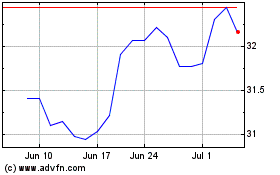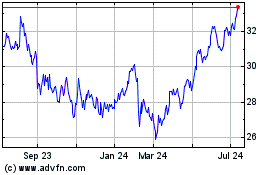With his company's pursuit of Fox, CEO Robert Iger's formula
faces its biggest test.
By Erich Schwartzel and Ben Fritz
This article is being republished as part of our daily
reproduction of WSJ.com articles that also appeared in the U.S.
print edition of The Wall Street Journal (July 7, 2018).
LOS ANGELES -- Disney Chief Executive Robert Iger has a
signature formula for making deals. First, target a company that
few know is even for sale. Then, win over the top executive by
extolling Disney's vision for the company's future. Finally, figure
out how to integrate the new company and its distinctive culture
into Disney's money-making franchise machine, across the empire's
movie, television, consumer products and theme parks
businesses.
It's a strategy Mr. Iger pursued successfully in Disney's three
biggest acquisitions during his tenure: Pixar Animation Studios,
Marvel Entertainment and Lucasfilm Ltd. These deals allowed Disney
to dominate the Hollywood landscape with megahits like "Star Wars:
The Last Jedi," "Black Panther" and "The Incredibles 2" in the past
year alone.
Now, that dealmaking playbook is being put to the test by the
company's riskiest pursuit yet. Disney is locked in a protracted
bidding war with Comcast Corp. to win major assets of 21st Century
Fox Inc., a media fight that's driven Disney's bid to $71 billion.
In contrast, the acquisitions of Pixar, Marvel and Lucasfilm cost
Disney less than $16 billion combined.
In his pursuit of Fox, Mr. Iger once again saw an asset that no
one thought was for sale. He again sold an iconoclastic top
executive -- in this case, media titan Rupert Murdoch -- on his
vision.
"It's the same approach, just magnified," said a person close to
Disney's previous deals.
But with Fox, Mr. Iger is asking his company to swallow an
acquisition that transforms his company's business strategy and is
nearly 10 times bigger than any previous purchase he's made as
CEO.
Both Disney and Comcast think acquiring Fox would give them the
leverage and scale they need to compete in a digital landscape
where tech firms like Netflix Inc. rule. In response to Netflix's
dominance, Mr. Iger has reorganized his company around a
Disney-branded streaming service set to launch next year with
original programming.
Mr. Iger's legacy, once seemingly secure, is on the line. If the
deal goes south, he may well be remembered more as the executive
who lost Fox than the one who built Disney into the entertainment
empire of the early 2000s.
And if it goes through, he will need to convince some Wall
Street skeptics of his plan.
"Arguing that acquiring Fox will help win the war in the fight
for the [direct-to-consumer] market is similar to Bob McNamara
arguing in 1965 that he could win in Vietnam if he had more
troops," Doug Creutz of Cowen & Co. wrote in a recent report.
Disney declined to comment on Mr. Creutz's report but noted that
other Wall Street analysts support the plan.
After postponing his retirement four times, Mr. Iger is now
scheduled to leave Disney in 2021, assuming the Fox deal is
completed.
When Mr. Iger took over as Disney CEO in 2005, he quickly became
a stabilizing force for a company in turmoil. His predecessor,
Michael Eisner, spent his final years preoccupied by contentious
boardroom drama.
His first major test as CEO came in 2006, when Mr. Iger made a
deal to buy Pixar Animation Studios. The production company behind
hits like "Toy Story" and "The Incredibles" had upstaged Disney's
own animation house, and Mr. Iger thought the acquisition could
rejuvenate its core business of family entertainment.
Winning Pixar required wooing Steve Jobs, the Apple Inc.
co-founder and Pixar chairman. Mr. Iger promised Mr. Jobs that
Pixar's creative culture would remain untouched, and that Disney
would promote the studio's characters across its multiple
divisions.
"Steve Jobs didn't do the deal because of Bob Iger. He did it
because of the strategic vision Bob laid out," a former Disney
employee said.
The ultimate price tag of $7.4 billion in Disney stock was on
the high end of bankers' estimates of Pixar's worth, according to
people familiar with the negotiations.
It proved to be a savvy move. Pixar has since produced some of
Disney's biggest hits, including "Finding Dory." The company's
chief creative executive, John Lasseter, led Disney Animation
through a renaissance that brought "Zootopia" and "Frozen" to the
screen. (Mr. Lasseter left the company last year following
allegations of inappropriately touching subordinates.)
The Iger playbook also came in handy with the 2009 acquisition
of Marvel Entertainment. The $4 billion purchase caught Hollywood
by surprise, since Marvel wasn't officially for sale. Mr. Iger
personally wooed its chief executive and controlling shareholder,
Ike Perlmutter, much as he did Mr. Jobs, by promising him broad
autonomy along with access to Disney's vast resources, according to
people with knowledge of that deal.
And in 2012, Mr. Iger met George Lucas to discuss buying
Lucasfilm Ltd., another $4 billion deal that's resulted in megahits
like "The Force Awakens" and "Rogue One." Again, few knew Mr. Lucas
was considering retirement, and people close to Lucasfilm speculate
the company could have fetched a higher price if it had entertained
competing offers. Again, Mr. Iger won out.
The pursuit of Fox is one step in Mr. Iger's new quest: to
transform Disney into a digital powerhouse that can compete with
Netflix. By the time Messrs. Iger and Murdoch began hashing out a
possible deal at Mr. Murdoch's Los Angeles vineyard last year,
Disney had already announced plans to launch its own streaming
service. (21st Century Fox and Wall Street Journal parent News Corp
share common ownership.) Buying Fox fit into the existing plan, so
the talks moved forward.
Things quickly grew complicated when Comcast entered the fray.
Disney and Fox agreed to an all-stock deal in December valued at
$52.4 billion. Last month, Comcast put in an unsolicited $65
billion all-cash bid for the assets, prompting Disney to boost its
offer to a $71.3 billion mix of cash and stock. The move could
strain Disney's balance sheet. And the steeper price caused a few
credit ratings agencies to put Disney on a downgrade watch.
Unlike Pixar or Marvel, Fox is too big to have a single company
culture, and absorbing it may be prove more challenging for Disney
than its prior acquisitions. The Fox Searchlight specialty film
division behind "The Shape of Water" is very different than the FX
cable network that made "Atlanta" or the Star satellite TV service
that airs cricket in India.
But Fox's difference from Disney could prove to be a major
asset, since it builds out a library of programming the company can
use in its streaming strategy. Fox-produced edgy entertainment
could also help siphon users from Netflix, who wouldn't typically
sign up for a family-oriented service.
Write to Erich Schwartzel at erich.schwartzel@wsj.com and Ben
Fritz at ben.fritz@wsj.com
(END) Dow Jones Newswires
July 07, 2018 02:47 ET (06:47 GMT)
Copyright (c) 2018 Dow Jones & Company, Inc.
Fox (NASDAQ:FOX)
Historical Stock Chart
From May 2024 to Jun 2024

Fox (NASDAQ:FOX)
Historical Stock Chart
From Jun 2023 to Jun 2024
